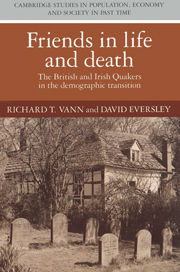Book contents
- Frontmatter
- Contents
- List of figures
- List of tables
- Preface
- Introduction
- 1 The quality of the sources
- 2 Characteristics of the sample
- 3 Marriage according to Truth
- 4 The fruitfulness of the faithful
- 5 The quality and quantity of life
- Conclusion
- Bibliography
- Index
- Cambridge Studies in Population, Economy and Society in Past Time
1 - The quality of the sources
Published online by Cambridge University Press: 23 September 2009
- Frontmatter
- Contents
- List of figures
- List of tables
- Preface
- Introduction
- 1 The quality of the sources
- 2 Characteristics of the sample
- 3 Marriage according to Truth
- 4 The fruitfulness of the faithful
- 5 The quality and quantity of life
- Conclusion
- Bibliography
- Index
- Cambridge Studies in Population, Economy and Society in Past Time
Summary
The study of the demography of the British and Irish Quakers is only made possible by the quality of the records they left behind. It is therefore necessary first to assess the reliability of the sources and establish that their imperfections are not so great as to render our statements about the Quakers speculative. This will be our task in this chapter.
Fortunately, the easiest sources to use were also the most reliable and comprehensive. These were the Irish Quaker family listings and the considerable array of genealogies compiled by descendants of the Quakers. The largest of these, by far, was that devoted to the descendants of Isaac and Rachel Wilson, Friends who lived in Westmorland in the mid eighteenth century, and who now have some 10,000 living descendants. The genealogies thus compiled, especially where they could be supplemented from the registers kept by the Quakers, were suitable for copying straight onto the family reconstitution forms – with the additional advantage that the danger of attributing events to the wrong person was considerably reduced. The family lists seem to have been kept with great faithfulness by the Irish Quakers in addition to the separate chronological record of births, marriages, and burials. These are found in the registers preserved in Dublin immediately following the marriage certificate of a Quaker couple. They show what children were born to the couple and usually which of the children died in childhood – or, if they survived, whom they married.
- Type
- Chapter
- Information
- Friends in Life and DeathBritish and Irish Quakers in the Demographic Transition, pp. 11 - 31Publisher: Cambridge University PressPrint publication year: 1992



